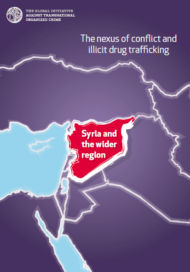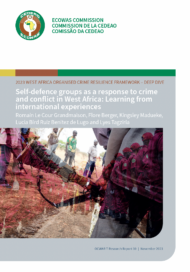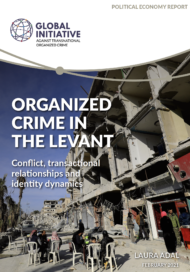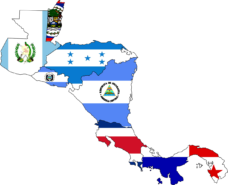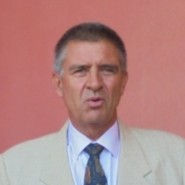Event Details
Posted on 06 Oct 2016
The Global Initiative with the support of the Geneva Peacebuilding Platform launched the report “The nexus of conflict and illicit drug trafficking Syria and the wider region“(November 2016) on 1st of November in Geneva in the Maison de la Paix.
The conflict in Syria has raged for over five years, creating massive destruction and human misery. Over six million people have fled Syria and over 12 million internally displaced.
The fragmented constellation of conflict actors that fuel the suffering are resourced by a variety of illicit resources, including cross-border smuggling of fuel, antiquities, and people. Though the challenge of illicit drug trafficking and production in Syria is not new, the conflict has triggered a shifting of routes and control groups, as well as a marked rise in trafficking in the drug ‘captagon’. Captagon is a drug compound fenethylline hydrochlide belonging to the amphentamine family which stimulates the central nervous system producing a feeling of strength and fearlessness, which evidence is being manufactured in Syria in increasing quantities to supply both internal and external demand.
Unlike many other drugs, the primary destination market for captagon is countries in the Arab peninsula and increasingly Syria and the Syrian diaspora. Within Syria, people living under extreme conditions have turned to drug use, and combatants from all parties to the conflict have use the drugs as stimulants. Syrian migrants and refugees are a community at risk of drug use and acting as mules to pay for their travel to European countries.
Despite the billions of dollars in profits this lucrative trade is pouring into the political economy of Syria’s conflict, attention given to countering drug trafficking has largely been outweighed by other political priorities. Yet there are long term concerns for the stability, rule of law and public health, which unless they are recognised now and responses planned for, will jeopardise peace consolidation in an eventual post-conflict Syria, and have serious regional ramifications.
This report by the Global Initiative against Transnational Organized Crime looks at the current impact of drug trafficking and conflict within Syria and neighboring countries, discussing trajectories, development and organised crime response to the challenge and opportunity conflict provides, as well as implications for development actors in a post-conflict Syria.
The event included a presentation by the report’s author Benjamin Crabtree as well as comments by Tuesday Reitano, Deputy Director of the Global Initiative, and Achim Wennmann, Executive Coordinator of the Geneva Peacebuilding Platform and Senior Researcher at the Graduate Institute’s Centre on Conflict, Development and Peacebuilding (CCDP).
During the Q&A session participants asked questions regarding the virtual black market, political will of financial institutions to investigate illicit financial flows, and a possible connection between different conflict zones such as between Libya and Syria. Evidence suggests that social media (such as snapchat and whatsapp) play an increasing role in communications, and that many drug traffickers know how to use these tools to their advantage. Indeed, merely “following the money” is not as straightforward when it comes to drug trafficking. There has been a major drug shipment intercepted between Syria and Libya which suggests linkages of criminal groups, perhaps even ISIS.
In addition, Achim Wennmann highlighted that international actors have to be aware of such issues when planning post-conflict reconstruction: In the planning of the reconstruction of Syria, the Syrian regime is already trying to set up public-private partnerships. As those actors profiting from drug trafficking often keep hold of their power and move into official politics once a crisis is over, illegal power arrangements might be strengthened and further embedded into a future state.
